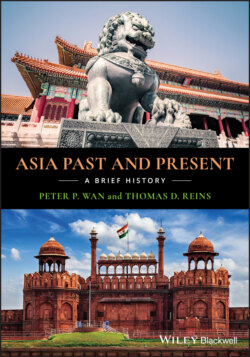Читать книгу Asia Past and Present - Peter P. Wan - Страница 35
Kong Zi and Confucianism
ОглавлениеKong Zi founded the Confucian school of philosophy, which is a comprehensive ideological system that embraces his thinking on virtue, politics, history, historiography, aesthetics, and education. He created a sociopolitical vision that was based on an idealized “Golden Age” of the Western Zhou period, and his lifelong ambition was to restore the stability and harmony of that distant and idealized past.
Confucius.
Source: DEA PICTURE LIBRARY/Getty Images.
Kong Zi (aka Confucius, 551–479 BCE) was born in the State of Lu, just downriver from the “Cradle of Chinese Civilization.” He learned to read and write as a child, but suffered from poverty because his father died when he was very young. As an adult, he played music at funerals, which was considered a very demeaning vocation at the time. Later, he became a petty official whose duty was to maintain social order and pursue thieves and robbers.
But he had great talent and ambition. He studied the Zhou classics and developed a vision of an ideal society. He traveled from state to state, seeking the ear of men in power to promote his vision. Advocating the rule of virtue and benevolent governance was a hard sell in a land ravaged by war. No one took him seriously, although some regarded him as a sage.
Disillusioned with politics by age 68, he remained unshaken in his idealism. He rededicated the remaining years of his life to education. He became a private teacher, taking students regardless of their social status. He tutored them in the “six arts”: morality and rituals, music and poetry, archery, horsemanship, reading and writing, and mathematics. He allegedly had 3000 students over the years, 70 of whom became prominent.
At the core of his philosophy is the concept of “benevolence,” which he defines as “the love of humanity,” which is supported by the concepts of “hierarchy” and “reciprocity.” His ideal family is headed by a father who has the responsibility of caring for his family, while other family members have the duty of showing filial respect to him, and caring for one another. His ideal state is modeled on an expanded family. The ruler is the head of the state, just as the father is the head of the family. He has the duty of practicing benevolent governance, and has the right to demand loyalty from his subjects, who have the duty of being loyal and obedient to him and living in harmony with one another. In this arrangement, one must obey one’s superior, but in turn, one has the right to expect guidance and protection from him. Both the family and the state structures are hierarchic, and people in them relate to one another in unequal but reciprocal ways.
According to Confucius, a ruler who is virtuous and competent receives the “Mandate of Heaven” to rule. However, the mandate is conditional and transient: A ruler enjoys this privilege only as long as he provides benevolent governance. Should he fail, the multitudes of common people would suffer, and Heaven would hear their cries, snatch the mandate from him, and bestow it on a deserving successor.
Confucius believed that the “Golden Age” of Western Zhou embodied this kind of virtue, harmony, and stability. And he believed that the only way to restore it was to reestablish a social hierarchy in which each person has a designated place, stays in that place, and dutifully plays his or her designated role. Follow this prescription and all may live happily ever after; violate this principle and society loses its equilibrium and plunges into chaos.
Confucius believed that people are good by nature. However, it takes education to bring out that innate goodness. He divided people into the “superior person” and the “inferior person.” The two categories are defined by virtue, not by birth or wealth. Consequently, he put a premium on education, and advocated the principle that “education knows no class distinction.” Up to his time, education was the exclusive realm occupied by the elite, but he threw wide open the doors of education to the commoners. Later generations honored him as the “Model Teacher of All Time.”
His aesthetic thinking required a unity of goodness and beauty (i.e., the integration of literary refinement and political morality). This placed the heavy burden of moral and political functions on art and literature. It caused later rulers to require works of art and literature to be morally and politically “correct.”
Confucius focused his attention on people—their relationships to one another and to society. He had little to say about economics or science and technology. And in a time when most people were profoundly influenced by their beliefs in the supernatural, he conspicuously advised them, “Respect the ghosts and gods, but keep at a distance.”
Meng Zi (aka Mencius, 372–289 BCE) was a Confucian sage, second only to Confucius. He emphasized a man’s duty to his family, his clan, and his country. He was sidelined by conservatives in later times because of his radical idea that the multitude of common people is more precious than the ruler and state, and a popular uprising against a despotic government (Qi Yi, or bringing up righteousness) is justified.
